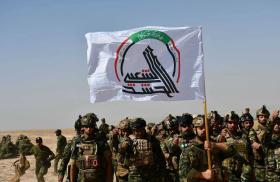
The Iraqi Muqawama Are Feeling Isolated and Threatened

The brazen approach taken by "resistance" factions in recent weeks was designed to undermine the government, but it is now coming back to hurt them.
The Iraqi muqawama (resistance) militias are feeling increasingly isolated and under threat. The schism between them and the pro-Sistani Atabat (shrine) militias is widening. On June 17, al-Abbas Shrine Foundation, which oversees al-Abbas Combat Division, held a conference in Karbala to commemorate the anniversary of Ayatollah Ali al-Sistani’s fatwa on fighting the Islamic State. When Sistani representative Ahmed al-Safi spoke at the event (Figure 1), he did not mention slain Iranian general Qasem Soleimani or militia leader Abu Mahdi al-Muhandis, which angered people within the muqawama.
An influential muqawama-affiliated Twitter account called Ibn al-Skeit (@khaivvvv7) harshly criticized Safi in a post that ended with the hashtag "reactionary hatred" (Figure 2). Although representatives of the Iraqi security forces were present (including Joint Operations Command spokesman Tahsin al-Khafaji), no one from the Popular Mobilization Forces (PMF) Commission was seen at the event. The next day, the PMF Commission held a similar event, and this time no one from the Atabat was present.
Other developments reinforce this sense that muqawama relations with Sistani-affiliated foundations are deteriorating. On June 19, Sabereen News criticized the Ministry of Agriculture for "granting al-Abbas Shrine Foundation special permission to import poultry meat, while the government prevents the businesspeople working in the food industry in Jamilah market from importing poultry." And on June 14, the PMF Commission was supposed to stage a big parade to celebrate the anniversary of Sistani's fatwa. For weeks muqawana accounts promoted the event by posting tens of clips showing preparations for the event (Figure 3). But the parade was delayed, and no hew date for holding it has been set. Sources familiar with the matter told Militia Spotlight that Sistani's office is not happy with the proposed parade because the PMF failed to approach the commander-in-chief, Prime Minister Mustafa al-Kadhimi, for permission.
This seems to be one of the consequences of the muqawama’s recent brazen acts, such as a May siege against the International Zone after the arrest of militia commander Qasim Muslih, and a March parade staged by Kataib Hezbollah faction Rab Allah, which was seen as a show of power to undermine the prime minister. In the case of Muslih, the muqawama tried hard to portray themselves as the victors but came out of the incident bruised, with their siege of the International Zone's outer perimeter showing clear signs of overreach. This in turn made it harder for Sistani to keep silent about PMF acts that do not respect the Iraqi chain of command. The muqawama are afraid of Sistani’s explicit disapproval, and these types of brazen acts make him more likely to call them out publicly.
Indeed, the muqawama seem to believe they are constantly under threat. On June 15, for example, Asaib Ahl al-Haq leader Qais al-Khazali turned to al-Ahd TV to express his fears about such threats: “As for the project to target the Hashd [PMF]...there is no indication that those behind it intend to stop...I address the masses of the Hashd to be ready to defend their Hashd...If things develop further and the situation becomes critical, we will ask you...to take to the streets." This is the first time since the establishment of the PMF that one of its prominent leaders has called on supporters to protect the military organization—seemingly from the Iraqi government.






